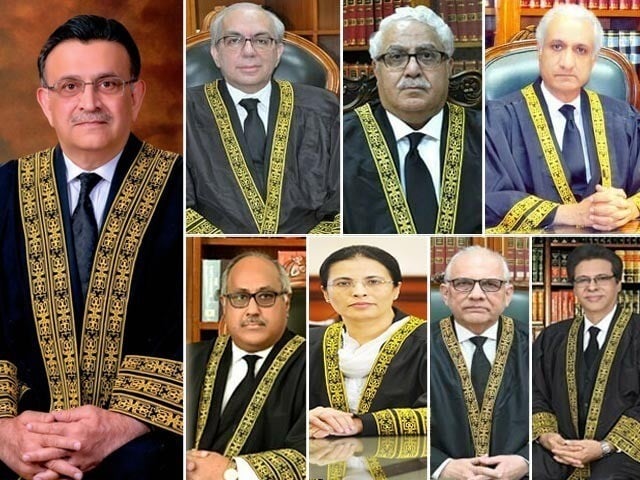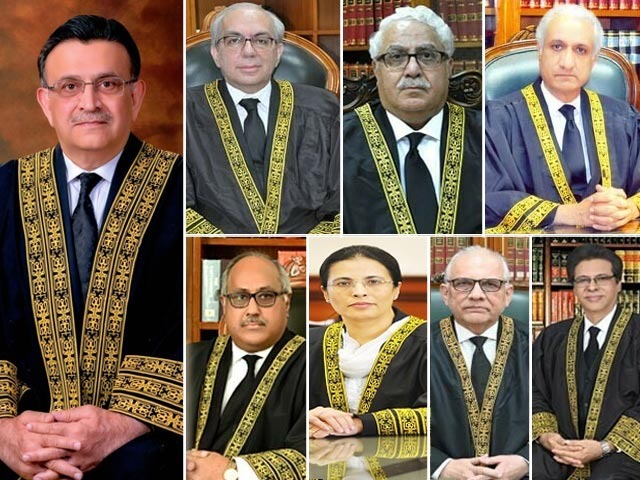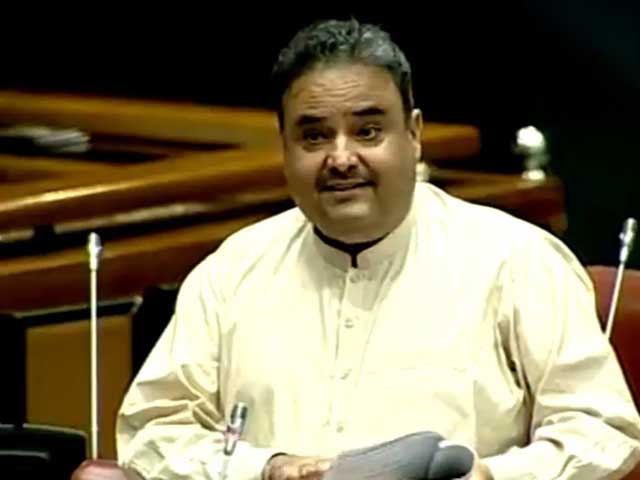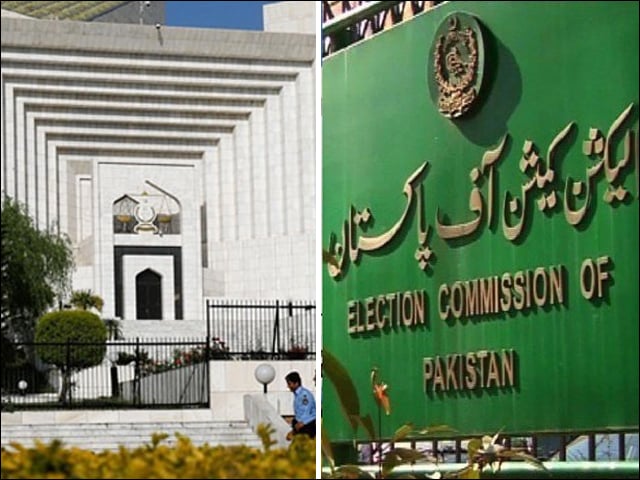
Notice issued to Federal Government, Attorney General, Political parties, Pakistan Bar Council and Supreme Court Bar
Islamabad: The Chief Justice of Pakistan has remarked during the hearing of petitions against the Supreme Court Powers Bill that there has been no constitutional violation to be reviewed.
An 8-member bench of the Supreme Court headed by the Chief Justice of Pakistan heard the petitions against the “Supreme Court Practice and Procedure Bill” in the Supreme Court. A large number of Rangers were present inside and outside the Supreme Court while a heavy contingent of police and FC was also deployed.
Petitioner Raja Amir’s lawyer Imtiaz Siddiqui, opening the arguments, told the court that this case is of great importance in the current situation. After the Qasim Suri case, the political divide has increased a lot. After the restoration of the National Assembly, the political crisis increased. The federal government and the Election Commission are not willing to hold elections.
Imtiaz Siddiqui Advocate said that the court had to take notice of itself for not conducting the elections. The court ordered the Election Commission to conduct the elections. On April 3, the court ordered re-election. After the court order to implement the constitution, more problems arose. Personal criticism was made on the court and the judges. Government ministers and members of parliament are responsible for this.
The counsel further submitted in his arguments that the proposed legislation interfered with the independence of the judiciary. After the approval of both houses, the bill was sent to the President. The President raised objections and sent the bill back to the Assembly. The President’s objections to political differences were not examined. The bill will become a law within 10 days after approval by the joint session. Under Article 191, the Supreme Court makes its own rules.
Imtiaz Siddiqui Advocate further said that a 3-member committee will decide on the automatic notices and formation of benches under the bill. The main question is whether this bill is worthy of becoming a law. It is illegal for the Cabinet to ratify the bill. Both presentation and approval of bills in the Cabinet are administrative matters. It is also unconstitutional to present the bill in the assembly and get its approval. The bill is not pending but a proposed act.
The lawyer said that whether the President assents or not, the Act will become part of the law. The Supreme Court can invalidate the bill passed by the Parliament. There is no Supreme Court without the Chief Justice. With the appointment of the Chief Justice, the Supreme Court begins its work. Even if other judges are present without the Chief Justice, the court is not complete.
Imtiaz Siddiqui advocate argued that the powers of the Chief Justice and judges cannot be reduced. The office of the Chief Justice cannot be used by any other judge. How can the office of the Chief Justice be shared with 2 senior judges? The Supreme Court has given several decisions on the independence of the judiciary. The Supreme Court can review the actions of every institution of the state. The Supreme Court has declared in the Qasim Suri case that the actions of the Parliament can also be reviewed. In the past, the court has declared that the bill cannot be stopped from being passed. If the bill is passed, the court can review it. According to the court decision, the proposed act can be reviewed even before the assent of the President.
The petitioner’s lawyer further said that the court is the protector of the constitution and empowered to do justice and all institutions are bound to obey the orders of the Supreme Court. There are rules of the Supreme Court which Parliament cannot amend.
The Chief Justice remarked that according to him the independence of the judiciary is a fundamental right which is fully protected by the Constitution. According to you, like the Parliament and the Executive, the Judiciary also enjoys constitutional protection.
Advocate Imtiaz Siddiqui argued that the president is a symbol of the unity of the state of Pakistan. The office of the President is not merely ceremonial in nature. The President directed to re-examine the bill. After the approval of the assembly, the bill cannot be amended. After the passage of the bill, the legislative process is considered complete. The order of the court in the present case will not interfere with the pending legislation. Parliament has completed its work, so this interference will not be considered.
He further said that in the case of the Hasba bill also, the Supreme Court reviewed the developed bill. The Supreme Court rejected the objections that the Hasba Bill case was inadmissible. The Supreme Court declared the Hasba Bill unconstitutional. The Hasba Bill came to the Supreme Court in the form of a presidential reference. The present case pertains to Article 184/3 in which the Court has greater jurisdiction.
The lawyer argued that in Article 184/3, the Supreme Court has ordered the demolition of the marriage hall. All the orders of the court were subject to fundamental rights. Is the independence of the judiciary not the basic right of the people? The proposed law sought to curtail the powers of the Chief Justice. Constitution 184/3 provides for right of review not appeal. A judge of the Supreme Court cannot hear an appeal against another judge. Many times we lawyers have also been victims of 184/3. In ordinary cases, the review case does not last even 5 minutes. In some cases, revision cases last several months. The question is whether Parliament can regulate the internal affairs of the Judiciary.
Imtiaz Siddiqui Advocate said that the court should stop the proposed act from becoming a law till the verdict. Justice Muhammad Ali Mazhar remarked that the Hasba Bill came in the form of a reference. In the Hasba Bill, the Governor was prevented from signing the bill. The counsel pleaded that the Law Ministry be restrained from notifying the proposed Act as a law pending the decision.
The lawyer said that if a case is heard by a 10-member bench, how can an appeal be filed? Can junior judges hear an appeal against the decision of senior judges? All judges are equal. In the Justice Faiz Isa case, the reference was in the Supreme Judicial Council. Senior judges were hearing the reference. In the present case the steps prior to the passage of the bill should also be examined.
Justice Muneeb Akhtar asked what he wanted from the court in the present case, to which the lawyer said that the Supreme Court Practice and Procedure should be declared unconstitutional.
Later, the Supreme Court adjourned the hearing of the case after hearing the arguments. The court issued notices to the federal government, attorney general, political parties, Pakistan Bar Council and the Supreme Court Bar. The court directed the Attorney General to assist.
The Chief Justice remarked that the independence of the judiciary is an important issue. Parliament is highly respected. The case will be rescheduled soon. It has to be reviewed that there was no constitutional violation in this matter. Keeping in view the availability of judges, they will be appointed for early hearing.
It should be noted that the 8-member larger bench of the Supreme Court is hearing the petitions filed against the Supreme Court Practice and Procedure Bill 2023. Justice Ijazul Ahsan, Justice Muneeb Akhtar, Justice Mazahir Naqvi, Justice Muhammad Ali Mazhar, Justice Ayesha Malik, Justice Hasan Azhar Rizvi and Justice Shahid Waheed are included in the bench, while the judges who wrote dissenting notes in recent days are not part of the larger bench. .
2 constitutional petitions against the proposed Law Practice and Procedure Act have been filed in the Supreme Court, which were filed by the citizens named Chaudhry Ghulam Hussain and Raja Amir Khan through the mediation of Advocate Tariq Rahim and Azhar Siddique and in which the Federation, Ministry of Law, Principal Secretary to Prime Minister and Principal Secretary to President Arif Alvi have been made parties.
It has been contended in the petitions that the proposed Supreme Court Practice Procedure Bill is based on bad faith, the proposed Bill is fraudulent with the Constitution. The petitions have requested the court to nullify the proposed bill as unconstitutional, to suspend the proposed law until the decision on the constitutional petition is made, and to prevent the President from signing the proposed bill.
(function(d, s, id){
var js, fjs = d.getElementsByTagName(s)[0];
if (d.getElementById(id)) {return;}
js = d.createElement(s); js.id = id;
js.src = “//connect.facebook.net/en_US/sdk.js#xfbml=1&version=v2.3&appId=770767426360150”;
fjs.parentNode.insertBefore(js, fjs);
}(document, ‘script’, ‘facebook-jssdk’));
(function(d, s, id) {
var js, fjs = d.getElementsByTagName(s)[0];
if (d.getElementById(id)) return;
js = d.createElement(s); js.id = id;
js.src = “//connect.facebook.net/en_GB/sdk.js#xfbml=1&version=v2.7”;
fjs.parentNode.insertBefore(js, fjs);
}(document, ‘script’, ‘facebook-jssdk’));



